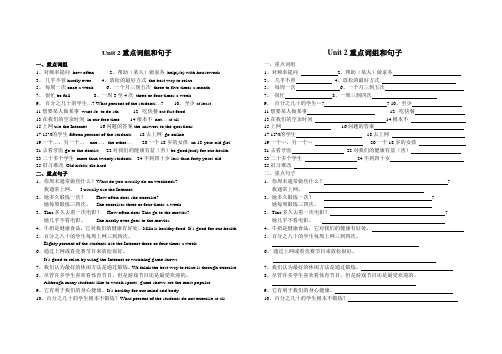unit2重点短语和句子
- 格式:ppt
- 大小:91.50 KB
- 文档页数:2

Unit 2重点词组和句子一、重点词组1、对频率提问how often2、帮助(某人)做家务help(sb) with housework3、几乎不曾hardly ever4、放松的最好方式the best way to relax5、每周一次once a week6、一个月三到五次three to five times a month7、很忙be full 8、一周3至4次three or four times a week9、百分之几十的学生…? What percent of the students…? 10、至少at least11.想要某人做某事want sb. to do sth. 12. 吃快餐eat fast food13.在我们的空余时间in our free time 14.根本不not… at all15.上网use the Internet 16.问题的答案the answers to the questions17.15%的学生fifteen percent of the students 18去上网go online19.一个…,另一个…one…,the other…20.一个18岁的女孩an 18-year-old girl 21.去看牙医go to the dentist 22.对我们的健康有益(害)be good(bad) for our health 23.二十多个学生more than twenty students 24.不到四十岁less than forty years old25.旧习难改Old habits die hard二、重点句子1、你周末通常做些什么?What do you usually do on weekends?我通常上网。
I usually use the Internet.2、她多久锻炼一次?How often does she exercise?她每周锻炼三四次。

人教版九年级英语上册Unit 2单词及重点短语(附例句)Unit2 I think that mooncakes are delicious!【重点单词】1.Mooncake ['mu:nkeɪk] n. 月饼△The moon cake made by grandma is delicious!奶奶做的月饼味道美极了。
△People gather around the table to eat moon cakes and enjoy the moon on the 15th of August every year.每年8月15日,人们围坐在桌子旁吃月饼,赏月。
ntern [ˈlæntə(r)n] n. 灯笼△Red lanterns are hung on both sides of the street on the Lantern Festival. 元宵节的时候,街道两旁都挂着红灯笼。
3.stranger [ˈstreindʒə(r)] n. 陌生人△Don't talk to strangers.不要和陌生人说话。
△How many strangers have come to our community today?今天有多少陌生人来到我们的社区?4.relative [ˈrelətiv] n. 亲属;亲戚△On the first day of new year's day, our parents took us to visit relatives. 在元旦的第一天,我们的父母带我们去拜访亲戚。
5.put on 增加(体重);发胖△During the outbreak, many people put on a lot of weight. 在疫情爆发期间,很多人的体重都增加了很多。
6.pound [paund] n. 磅(重量单位);英镑△Grace has 500 pounds.格蕾丝有500英镑。

九年级英语Unit 2Topic 11.看到鱼儿游来游去see fish swimming (see sb. doing sth.)2.去野餐have a piic/go for a piic3.城市面貌the look of our cities4.把废水倒入河里pour waste into river5.有用的事物something useful6.忍受/改善/保护环境stand /improve / protect the environment7.产生难闻的气味produce terrible gas8.情绪好/差in a good / bad mood9.设法做某事manage to do sth.10.感到不舒适feel unfortable11.对某人/某物有害be harmful to sb. / sth.(do harm to sb./sth.)12.目前,现在at present13.写信给某人write to sb.14.发出太多的噪音maketoo much noise15.打扰别人disturb others16.一种污染a kind of pollution17.对做了某事感到抱歉be sorry for doing sth.18.各种各样的all sorts of / all kinds of19.在吵杂的条件下in noisy conditions20.变聋了go / bee deaf21.听力丧失have hearing loss22.相当多quite a few23.(几乎)与……一样差no better than24.引发高血压cause high blood pressure25.在强烈、易变的光线下in strong, changeable light26.在许多方面in many ways27.随着人口的增长with the increase in population28.随着工业的发展with the development of industry29.对我来说很难呼吸。

5下Unit 2
四会单词
1、月亮
2、街道
3、在……附近
4、城市
5、乘……
6、公共汽车
7、出租车
8、自行车
9、飞机
10、轮船11、火车
重点短语
1、来学校
2、你的新家
3、离……远
4、在月亮街
5、骑自行车/乘公共汽车/飞机/轮船/出租车/火车/地铁
6、在城市图书馆附近
7、步行
8、在阳光镇9、一个出租车司机
10、骑自行车11、想要(做…)
12、把自行车展示给Sam 看
13、太年轻了14、认为如此
15、在篮子里16、到达那里
17、去那里18、许多城市
重点句型
1、你住在哪里?
我住在月亮街。
2、他住在哪里?
他住在阳光镇。
3、他们怎么来学校?
他们乘公共汽车来学校。
4、她怎么来学校的?
她步行来学校。

Unit 2 重点短语及句型背诵Key Phrases重点短语1.go to school 去上学2.get up 起床3.get dressed 穿上衣服4.eat/have breakfast 吃早餐5.take a shower 洗淋浴6.at six thirty 在六点半7.radio station/show 广播电台/广播节目 8.from...to...从.....到...... 9.at night 在夜间10.after that 在那之后 11.go to work 去上班 12.be late for work 上班迟到13.brush teeth 刷牙 14.on weekends( 在)周末 15.half past six in the morning 早上六点半16.go home 回家 17.a quarter past three in the afternoon 下午三点一刻18.do (one's) homework 做作业19.go to bed (early)(早早)去睡觉 20.take a walk 散步;走一走 21.eat quickly 快速地吃22.play/do sports 做运动 23.get home 到家 24.half an hour 半小时25.after dinner 晚餐后 26.eat a good breakfast 吃一顿丰盛的早餐 27.either..or...或者...或者...28.play computer games 玩电脑游戏 29.be good for..对.....有益/好处 30.lots of/a lot of...大量,许多Key Sentences 重点句型1.What time do you usually take a shower, Rick? 里克,你通常几点钟洗淋浴?2.I usually get up at six thirty.我通常在六点半起床。

Unit2 单元知识归纳一、指示代词:this,that,these,thosethis和that指说话人较近的人或物,these和those指说话人较远的人或物。
this和that指单数,连系动词be动词用单数形式is,同时后面的名词用单数形式;these和those表示复数,连系动词be动词用复数形式are,同时后面的名词用复数形式。
1.在回答主语this或that的一般疑问句或特殊疑问句时,在答语中用it代替句中this或that;在回答主语these或those的一般疑问句或特殊疑问句时,在答语中用they代替句中的these或those。
2。
在介绍某人时,用this或that,而不用he或she。
3.打电话时,说自己是谁用This is…,问别人是谁用Who’s that?二、单数形式的句子转换成复数形式的句子:1。
指示代词的变化:this→these,that→those;2.人称代词的变化:第一人称I变为we,you不发生变化,he/she/it变为they;3。
be动词的变化,am和is变为are;4。
可数名词的变化,此处为学习重点.①一般情况下在词尾加s。
例:pen→pens,friend→friends②以s,x,ch,sh结尾的词加es. 例:watch→watches,bus→buses③以o结尾的词加s或es。
例:photo→photos,tomato→tomatoes④以辅音字母加y结尾的词,变y为i再加es。
例:family→families⑤以f或fe结尾的词,变f或fe为v,再加es。
例:knife→knives二、人称代词:I, she, he, they1。
人称代词I在任何情况下都要大写,且常与am连用。
例:I’m Chinese。
2。
在口语中,如果人称代词孤立地用于不带谓语动词的句子中作主语,习惯上用宾语。
例: I like playing basketball. Me, too.3.单数人称代词并列主语时,在英语中的顺序是:第二人称→第三人称→第一人称即:You and me;he and I ; you,he and I 例:Are you and she friends?4。
人教版九年级英语上册Unit 2单词及重点短语(附例句)Unit2 I think that mooncakes are delicious!【重点单词】1.Mooncake ['mu:nkeɪk] n. 月饼△The moon cake made by grandma is delicious!奶奶做的月饼味道美极了。
△People gather around the table to eat moon cakes and enjoy the moon on the 15th of August every year.每年8月15日,人们围坐在桌子旁吃月饼,赏月。
ntern [ˈlæntə(r)n] n. 灯笼△Red lanterns are hung on both sides of the street on the Lantern Festival. 元宵节的时候,街道两旁都挂着红灯笼。
3.stranger [ˈstreindʒə(r)] n. 陌生人△Don't talk to strangers.不要和陌生人说话。
△How many strangers have come to our community today?今天有多少陌生人来到我们的社区?4.relative [ˈrelətiv] n. 亲属;亲戚△On the first day of new year's day, our parents took us to visit relatives. 在元旦的第一天,我们的父母带我们去拜访亲戚。
5.put on 增加(体重);发胖△During the outbreak, many people put on a lot of weight. 在疫情爆发期间,很多人的体重都增加了很多。
6.pound [paund] n. 磅(重量单位);英镑△Grace has 500 pounds.格蕾丝有500英镑。
九年级Unit2重点短语句子Unit 2重点短语句子1.used to do 过去常常干…2.be terrified of +n./doing 极度恐惧的3.go to sleep 入睡4.chew gum嚼口香糖5. in the end最后、终于6. make a decision to do做决定、下决心去做…7. to our surprise令我们吃惊的是…8.even though即使、尽管9. take pride in/be proud of对…感到自豪10.pay attention to对…注意11.give up doing放弃干…12.I’m more interested in sports.我对运动更感兴趣。
13.pay for为…付钱14.I used to be on the soccor team.我以前在足球队上。
15.I’m on the swim/swimming team.我是游泳队的成员16. You used to be afraid of the dark,didn’t you?你以前很怕黑,对吗?He used to wear glasses, didn’t he?他过去戴眼镜,是不是?She used to have red and curly hair,didn’t she?她以前有红色的卷发,是吧?-They didn’t use to like tests,did they?-No,they didn’t. They used to fail the tests.-他们以前常常不喜欢考试,是不是?-是,他们常常考试失败。
-Did you use to play the piano? -你以前常弹钢琴吗?-Yes, I did./No,I didn’t. 是的,我是。
/不,我不是。
There used to be abig building,didn’t there?这儿以前有一座大建筑,是吗?He can hardly speak English,can he?他几乎不会说英语,对吗?17.-Don’t you remember me?-难道你不记得我了?-Yes,I do. –不,我记得。
八年级英语下册 Unit 2 重点短语及句型总汇一、重点短语1.look after:照顾,照料2.take care of:照顾,照料3.look forward to:期待,盼望4.at the moment:此刻,目前5.take a message:捎个口信6.all day:整天,一整天7.get back to:回复,回电8.leave a message:留个信息9.make a decision:做决定10.at present:目前,现在11.call back:回电,回复电话12.by the way:顺便说一下,顺便问一下13.take turns:轮流,依次14.in the past:在过去15.right away:立刻,马上16.as soon as possible:尽快,早日17.be good at:擅长于18.take a break:休息一会儿19.on the phone:打电话,通过电话20.in the end:最后,终于二、重点句型1.Can you take care of my dog while I’m away?–当我不在的时候,你能照顾我的狗吗?2.I’m really looking forward to your visit next week.–我真的很期待你下周的访问。
3.Sorry, he’s not available at the moment. Can I take a message?–对不起,他现在不在。
我可以捎个口信吗?4.Please call me back as soon as possible.–请尽快给我回电。
5.By the way, have you made a decision about the school trip?–顺便问一下,你对学校的旅行做了决定吗?6.Let’s take turns to help with the cleaning.–我们轮流来帮忙打扫吧。
英语八(下) Unit2重点短语和句子——短语1.在外面工作work outside2.清扫 / 清洁日clean up / Clean-Up Day3.使变得高兴cheer up4.分发give out=hand out5.在食品救济中心at the food bank6.在课外学习小组in an after-school studyprogram7.推迟做put off doing8.想出come up with=think up9.张贴标志put up signs10.给他打电话call him up11.从现在起两周two weeks from now12.过去常常used to do13.关爱关心care for14.在意care about15.好几个志愿者several volunteers16.志愿去做volunteer to do17.在养老院in an old people’s home18.帮助我们摆脱困境help us out19.艰苦的工作hard work20.得到强烈的满足感get a strong feeling ofsatisfaction21.愉快的表情the look of joy22.车的主人the owner of the car23.在她40岁时at the age of 40=when she wasforty years old.24.参加…的选拔try out (for)25.进行不同的旅行go on a different journey26.梦想成真a dream come true27.同时at the same time28.做通知/传单make notices29.注意某人做某事notice sb do sth 30.注意某人正做某事notice sb doing sth31.在我们的业余时间in our free time32.给无家可归的人筹款raise money for homelesspeople33.在午夜12点at 12:00 midnight34.独自旅行travel alone35.感到孤单feel lonely36.与…相像take after (区别be similar to)37.修理破旧自行车部件fix up brokenbike/bicycle parts38.捐赠give away39.建立set up (the group/factory/company…)40.残疾人the disabled /disabled people41.对某人来说做某事可能make it possiblefor sb to do sth42.对…有(很大)影响/作用make a(big/great)difference to43.接电话 answer the telephone44.开关门open and close doors45.让门开着/关着keep the door open /closed46.盲人/聋人the blind/ deaf47.想象成为一名科学家imagine being ascientist48.一只经过特殊训练的狗a special trained dog49.对…感到兴奋be excited about50.由于你的善良because of your kindness51.改变我的生活/改变主意change my life/changeone’s mind52.对…感兴趣be/become interested in = take aninterest in53.强项是…;擅长be strong in54.很奏效,很有用work out fine/well55.算出;解决work out56.家长热线电话a call–in center for parents英语八(下) Unit2重点短语和句子——句子1.我将帮忙打扫城市公园。